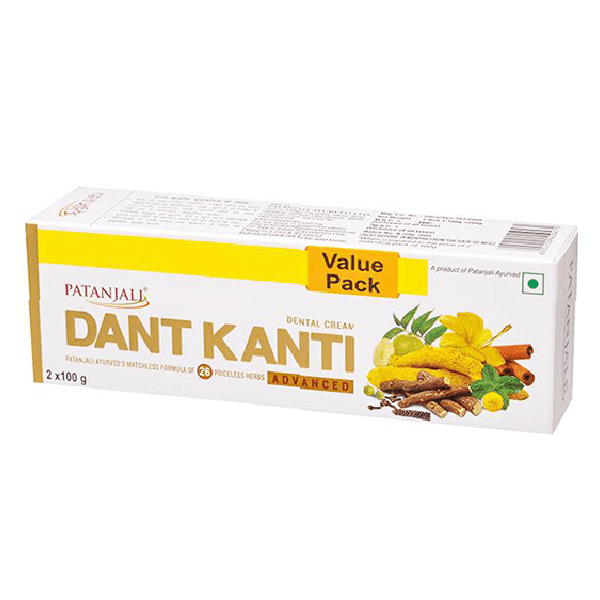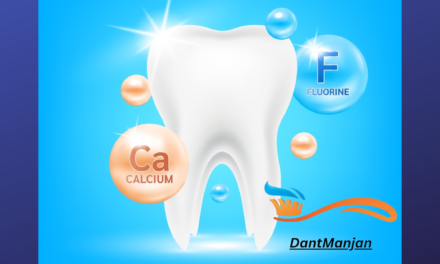Introduction
Oral hygiene is an essential aspect of overall health and well-being. Among various oral care products, Dant Kanti has emerged as a prominent herbal toothpaste in the Indian market, gaining widespread popularity due to its Ayurvedic formulation and effective results. Manufactured by Patanjali Ayurved Ltd., Dant Kanti promises comprehensive oral care with the benefits of natural ingredients. This article delves into the history, ingredients, benefits, variations, and overall impact of Dant Kanti toothpaste, highlighting why it has become a household name in oral care.
History and Origin of Dant Kanti
Patanjali Ayurved Ltd., founded by Baba Ramdev and Acharya Balkrishna in 2006, aimed to revolutionize the healthcare and consumer goods industry by promoting natural and Ayurvedic products. Dant Kanti was introduced as part of their personal care segment to provide a natural alternative to chemical-laden toothpaste available in the market. With a foundation rooted in traditional Indian medicine, Dant Kanti combines ancient Ayurvedic knowledge with modern manufacturing practices.
The toothpaste quickly gained traction due to its association with Patanjali’s philosophy of promoting swadeshi (domestic) products and its affordable pricing compared to multinational brands. It appealed not only to health-conscious consumers but also to those seeking to reduce their reliance on synthetic chemicals.
Key Ingredients of Dant Kanti Toothpaste
Dant Kanti’s formula is composed of several natural and Ayurvedic ingredients known for their therapeutic properties. Each component plays a significant role in maintaining oral health. Here are some of the key ingredients and their benefits:
-
Neem (Azadirachta indica):
Neem has antibacterial properties that help combat harmful bacteria in the mouth, reducing the risk of cavities and gum infections.
-
Babool (Acacia arabica):
Known for its astringent properties, babool helps strengthen gums and reduces bleeding.
-
Clove (Syzygium aromaticum):
Clove oil is a well-known natural remedy for toothaches due to its analgesic and antiseptic properties.
-
Pudina (Mentha):
Mint leaves provide a refreshing breath while also acting as an antibacterial agent.
-
Haldi (Turmeric):
Turmeric is known for its anti-inflammatory and antimicrobial properties, making it effective in reducing gum inflammation.
-
Peelu (Salvadora persica):
Peelu, often referred to as the “toothbrush tree,” strengthens teeth and removes plaque naturally.
-
Vajradanti (Barleria prionitis):
This herb is traditionally used in Ayurveda to maintain gum health and prevent tooth decay.
-
Majuphal (Quercus infectoria):
Majuphal has astringent properties that help tighten gums and reduce inflammation.
-
Bakul (Mimusops elengi):
Bakul bark strengthens gums and prevents bad breath.
Benefits of Using Dant Kanti
-
Natural and Chemical-Free Formula:
One of the primary reasons for Dant Kanti’s popularity is its natural formulation. It does not contain harmful chemicals like fluoride, parabens, or synthetic dyes, making it a safer choice for long-term use.
-
Effective in Treating Gum Problems:
Ingredients like neem, babool, and clove oil target common gum issues, such as swelling, bleeding, and sensitivity.
-
Prevention of Cavities:
The antibacterial properties of turmeric, clove, and neem help prevent plaque buildup and cavities.
-
Freshens Breath:
Mint and other aromatic herbs provide a long-lasting fresh breath.
-
Affordable and Accessible:
Compared to other herbal and chemical-based toothpaste, Dant Kanti is highly affordable and widely available across India and abroad.
-
Versatile Variants:
Dant Kanti comes in various formulations catering to specific needs, such as sensitivity relief, whitening, and advanced gum care.
Variants of Dant Kanti Toothpaste
To cater to diverse consumer needs, Patanjali offers multiple variants of Dant Kanti:
-
Dant Kanti Regular:
The standard version is suitable for daily use, offering overall protection against oral health issues.
-
Dant Kanti Advanced:
An enhanced formulation for more severe dental problems like pyorrhea and advanced gum care.
-
Dant Kanti Medicated:
Recommended for individuals with chronic oral issues such as gingivitis and tooth sensitivity.
-
Dant Kanti Junior:
Specially designed for children, this variant ensures mild and effective cleaning for young teeth.
-
Dant Kanti Aloe Vera Gel Toothpaste:
Enriched with aloe vera for added soothing and healing properties.
Comparison with Conventional Toothpaste
While conventional toothpastes rely heavily on synthetic chemicals for whitening, flavor, and preservation, Dant Kanti emphasizes the use of natural and Ayurvedic ingredients. Here’s a brief comparison:
| Feature | Dant Kanti | Conventional Toothpaste |
| Ingredients | Natural herbs and oils | Synthetic chemicals and flavors |
| Fluoride Content | Fluoride-free | Often contains fluoride |
| Side Effects | Minimal | Potential long-term side effects |
| Cost | Affordable | Ranges from affordable to premium |
| Sustainability | Eco-friendly formulation | Varies by brand |
Consumer Reception and Market Impact
The launch of Dant Kanti disrupted the oral care segment in India, traditionally dominated by multinational corporations. Its combination of affordability, efficacy, and natural ingredients appealed to a broad audience. Dant Kanti became a symbol of India’s growing preference for indigenous, eco-friendly, and health-conscious products.
According to industry reports, the success of Dant Kanti has inspired other brands to introduce herbal or Ayurvedic toothpaste. Companies like Colgate and Dabur have launched similar products to compete in this rapidly growing market segment.
Criticisms and Challenges
Despite its success, Dant Kanti has faced some criticisms:
-
Effectiveness for Severe Dental Issues:
While Dant Kanti works well for general oral hygiene, it may not be
 as effective as medicated toothpaste for severe dental conditions like advanced periodontal disease.
as effective as medicated toothpaste for severe dental conditions like advanced periodontal disease. -
Taste and Texture:
Some users find the herbal taste and slightly gritty texture of Dant Kanti less appealing compared to conventional toothpaste.
-
Lack of Clinical Studies:
Critics argue that more scientific studies are needed to validate the claims made about its efficacy.
Future Prospects
As consumer preferences continue to shift toward natural and sustainable products, the demand for herbal toothpaste like Dant Kanti is likely to grow. Patanjali’s ongoing efforts to expand its product line, coupled with increasing global awareness about Ayurveda, will further strengthen its position in the market.
The brand’s challenge will be to maintain its affordability while adhering to rigorous quality standards and addressing criticisms through innovation and transparency.
Conclusion
Dant Kanti toothpaste has established itself as a trusted name in oral care, blending traditional Ayurvedic wisdom with modern consumer needs. Its natural ingredients, affordability, and effectiveness have made it a preferred choice for millions. While it faces some challenges, its rise reflects a broader trend toward healthier and more sustainable consumer choices. Dant Kanti is not just a toothpaste; it represents a cultural shift towards embracing nature-based solutions for everyday health concerns.
Internal Link:-dantmanjan



